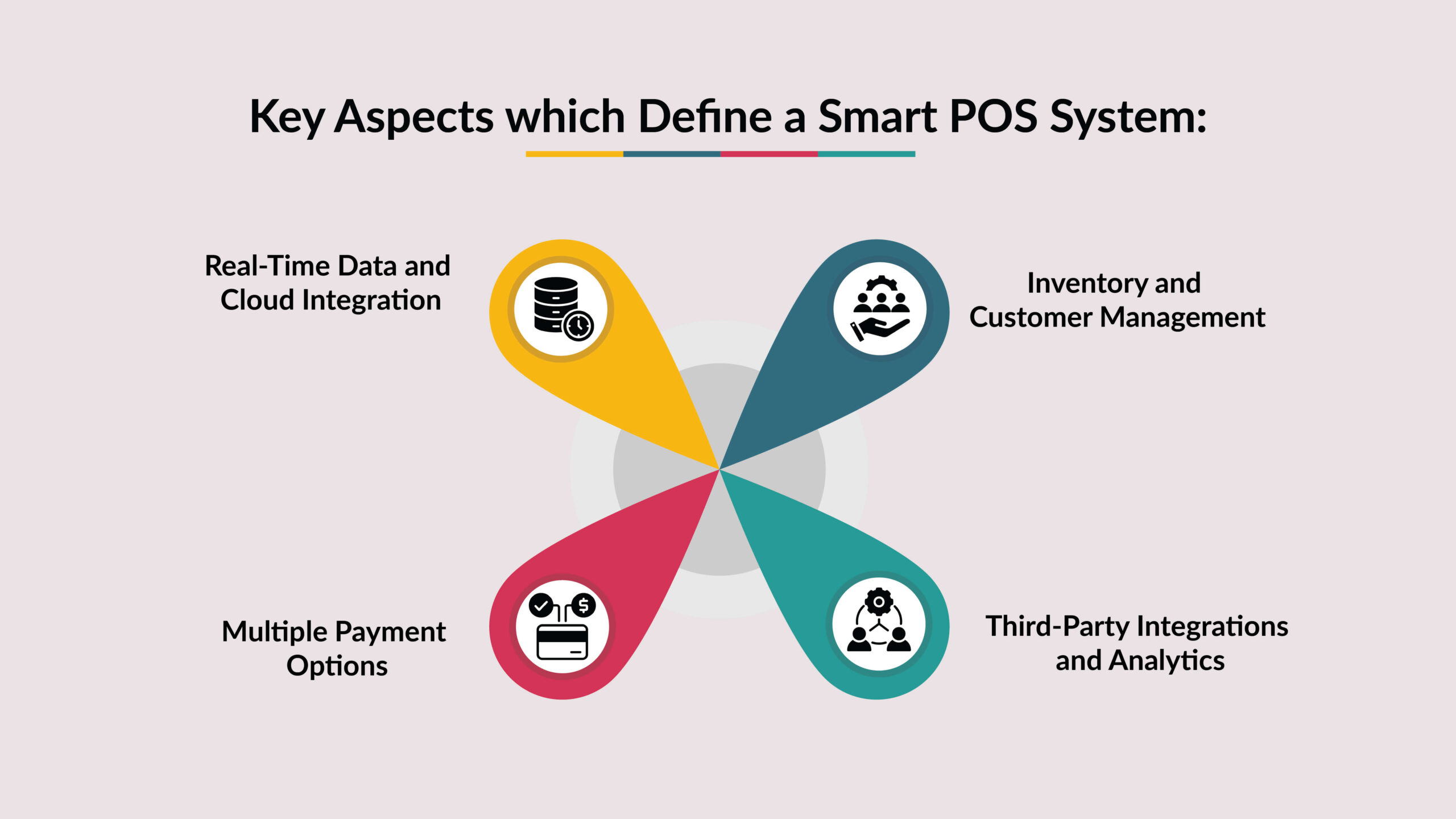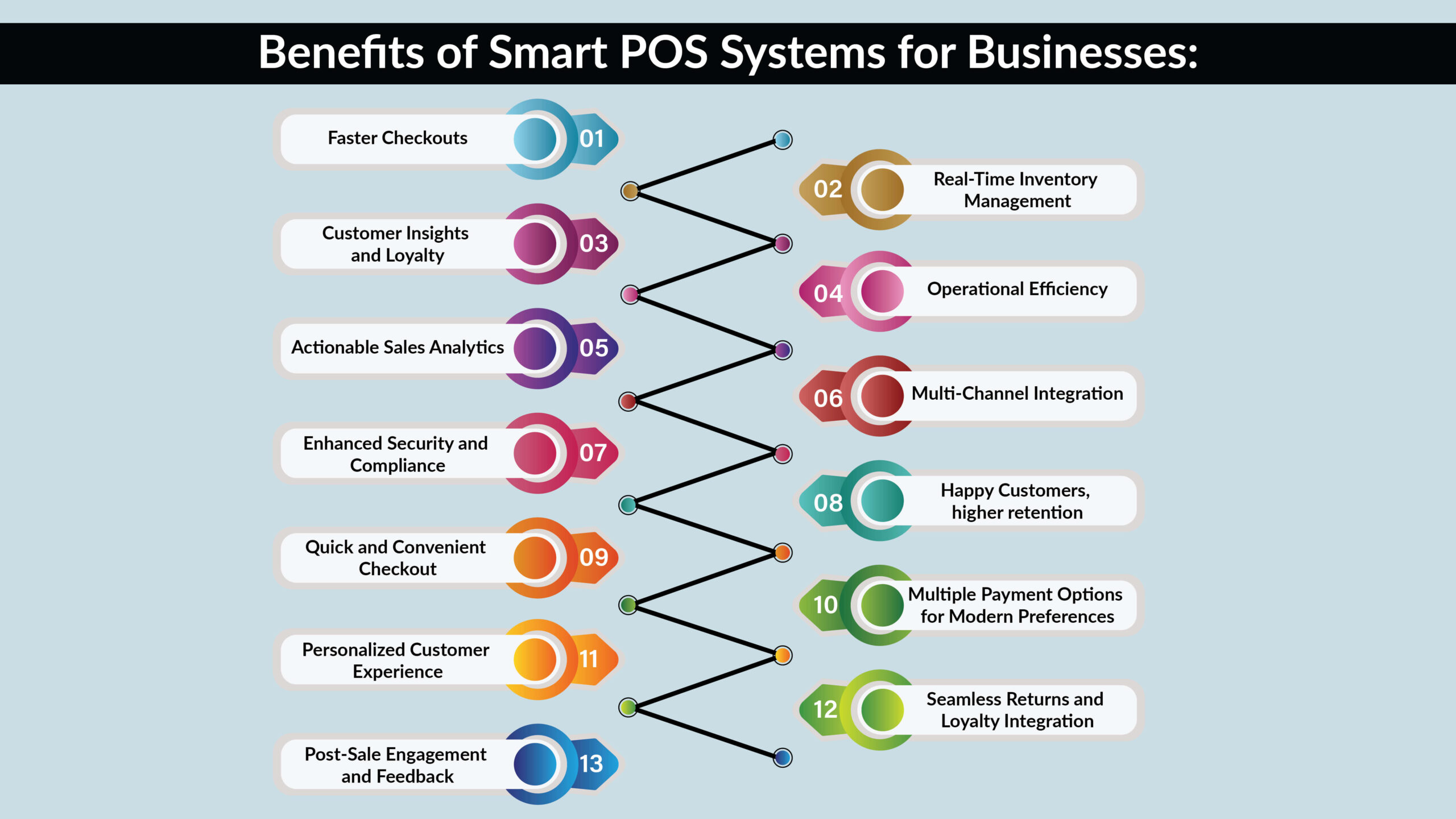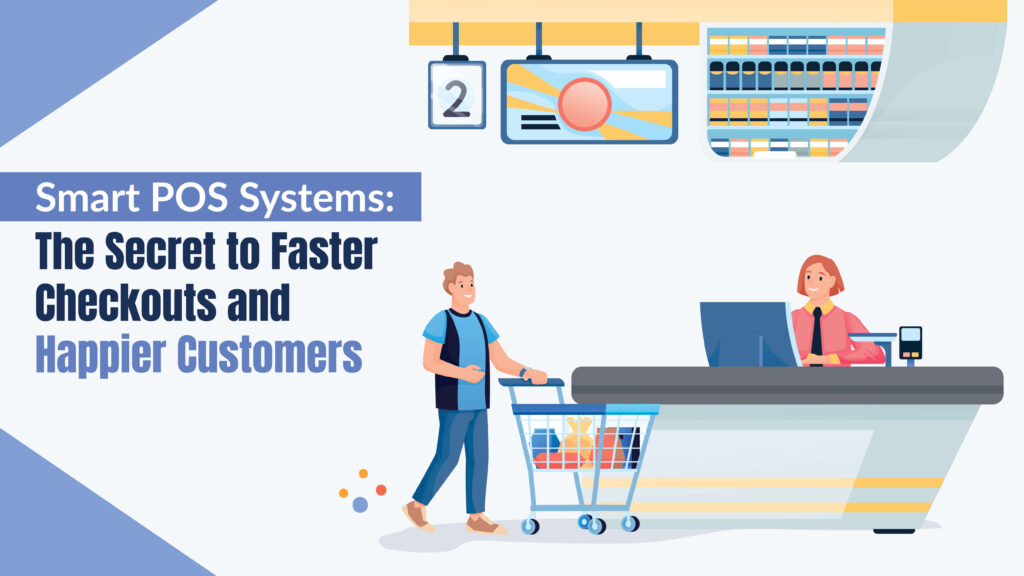Introduction:
In today’s fast paced era where customers seek speed, convenience, and personalization, traditional checkout systems are no longer as effective as before.
Smart POS systems are the modern solution which are designed to transform how businesses handle transactions, manage operations and improve the customer experience.
It is more than just digital cash registers, where these systems combine Point of sale technology with real-time data tracking, sales analytics, and inventory management due to which it is a powerful tool for fast retail and service sectors.
As there are many features like contactless payments, digital receipts, and mobile POS support, smart POS systems enable faster checkout processes.
So if you are running a busy retail store, a small cafe, or a mobile food truck, these tools simplify everything from order processing to stock control.
Such POS systems integrate smoothly with loyalty programs, eCommerce platforms, and CRM tools which provides a centralized system that helps to track customer engagement, performance, and ensure exceptional service delivery.
With more and more businesses adopting cloud-based POS systems, it helps businesses to access data at any time from any device which helps them to make quick decisions with proper insights.
It leads to improved customer satisfaction, scalable operations, and secure payment processing like Ace Merchant Processing which support long-term growth.
So whether an omnichannel retail or small businesses, smart POS systems are no longer optional rather essential. Through this blog we will explore how these systems empower businesses to function smarter, serve customers better, and grow faster in a competitive environment.
What is a Smart POS System?
A smart POS system is an advanced, all-in-one platform which can handle sales transactions but also simplifies business operations.
Smart POS systems offer a set of integrated features combining hardware, software, and connectivity which improves both customer service and business performance.
Key Aspects Which Define a Smart POS System:

1. Real-Time Data and Cloud Integration:
Such systems store data safely in the cloud, due to which business owners can track their real-time sales,inventory, and customer information from any device, anywhere.
2. Multiple Payment Options:
Such systems support different payment methods which include credit/debit cards, mobile wallets(like Apple Pay or Google Pay), contactless tap payments, and QR code scanning which offers both convenience and speed during checkout.
3. Inventory and Customer Management:
Smart POS systems have built in tools through which businesses can manage stock levels, generate alerts for low inventory, and store customer purchase histories, which helps in providing personalized service and effective restocking.
4. Third-Party Integrations and Analytics:
These systems integrate smoothly with eCommerce platforms, loyalty programs, CRM, and accounting software which gives you powerful analytics dashboards which will help businesses for better decision making.
How Does a Smart POS System Work?
A smart POS(Point of Sale)system works by integrating advanced software with modern hardware which helps to manage sales, inventory, and customer interactions in real time.
So whenever a transaction occurs, the system instantly records the sales, updates inventory levels and processes payments through different methods which includes cards, mobile wallets, or QR codes.
It tracks valuable information like customer preferences and their purchase history. Additionally, cloud connectivity offers centralized access and reporting which ensures that the data is synced across multiple locations.
Due to different features like digital receipts, loyalty integration, and analytics, smart POS systems smooth operations, improve customer service, and allow businesses to make informed decisions efficiently.
Smart POS Systems Vs. Traditional POS systems:
Smart POS systems are cloud-based, mobile-friendly which provide real-time analytics while traditional POS systems are often limited to basic transaction processing and require on-site hardware.
- Smart POS Systems: Advanced payments and checkouts, CRM, inventory management, employee management, accounts, etc.
- Traditional POS systems: provides basic payment processing and checkout
- Smart POS Systems: Accept mobile payments, digital wallets, reward points, gift cards, etc. in addition to traditional payment methods.
- Traditional POS Systems: payment options are limited as only debit and credit cards are accepted.
- Smart POS Systems: It is scalable and flexible.
- Traditional POS Systems: It is difficult to scale up.
- Smart POS Systems: quick, attentive, and personalized.
- Traditional POS Systems: slow and poorly personalized.
Benefits of Smart POS Systems for Businesses:

Smart POS systems not just manage transactions but empower businesses with tools to grow, adapt, and flourish. Below are the few benefits of adopting a smart POS system for your business:
1. Faster Checkouts:
Smart POS systems offer high checkout speed. Due to its intuitive touchscreen interfaces, product catalogs, and quick-scan barcode integration, it takes only a few seconds to complete any transactions.
There will be no transaction delays as companies can make payments using cards, contactless tap, mobile wallets, QR codes and more.
In restaurants, mobile POS systems allow staff to take orders and payments tableside which improve their efficiency during busy hours.
2. Real-Time Inventory Management:
Smart POS systems sync automatically with inventory databases. So each sale will update stock levels instantly due to which there will be no overstocking or running out of popular items.
Due to which businesses will be notified about low-stock alerts, automate reorders, or even track which of the products are performing the best.
It is because of this factor that businesses operate in different locations as they provide details regarding real-time inventory visibility which helps businesses to know if the stock is available and prevent losses due to manual errors.
3. Customer Insights and Loyalty:
Modern POS systems help businesses to collect important details about their customers like their purchase history, customer preferences, and feedback.
It helps businesses to do targeted marketing campaigns, give personalized discounts, and develop loyalty programs and rewards for customers who return.
4. Operational Efficiency:
Smart POS systems reduce the need for manual processes by automating tasks like sales tracking, tracking employee shift hours, and end-of-day reporting.
Managers can assign different user roles and permissions which ensure better control and accountability.
5. Actionable Sales Analytics:
By using smart POS systems you will have detailed sales reports and visual dashboards. Such analytics helps to track performance on hourly, daily, weekly, or monthly basis.
It helps businesses to find their best-selling products, busy hours, and staff performance. And due to data-driven decision making, you get to optimize pricing, staffing, and inventory strategies.
6. Multi-Channel Integration:
Smart POS systems can be integrated with an online store, mobile app, and in-person sales. It helps to create an omnichannel where inventory, customer data, and orders are unified.
Customers can buy online and pick up in-store, return items across multiple channels, or earn loyalty rewards wherever they shop online or offline.
7. Enhanced Security and Compliance:
Smart POS systems come with built-in PCI-DSS compliance, encryption, and secure login options.
You can assign access roles to staff, restrict sensitive data, and maintain audit logs. Many platforms also offer cloud backups, ensuring your data is safe even during hardware failure or theft.
8. Happy Customers, higher retention:
Smart POS systems truly improve every interaction at the point of sale, which play an important role in creating happy customers and happy customers are more likely to return.
9. Quick and Convenient Checkout:
Smart POS Systems lets users for faster and smoother transactions. Due to many options, availability like With support for contactless payments, QR codes, mobile wallets, and one-tap card readers, helps customers to make their payments quickly.
For most of the busy environments like coffee shops or convenience stores, this speed leads to increased customer satisfaction and higher throughput.
While many industries like restaurants and service businesses can use mobile POS devices which allows customers to make payments at their tables eliminating the need to stand in queue which helps to improve the overall customer experience even during busy hours.
10. Multiple Payment Options for Modern Preferences:
Customers love to use POS systems that offer them flexibility. A smart POS system supports a wide range of payment options which include credit/debit cards, UPI, digital wallets like Google Pay, contactless NFC. This flexibility ensures that no sale is lost due to limited payment choices.
11. Personalized Customer Experience:
One of the most important features of a smart POS system is its ability to track customer behavior and history. With every transaction, you are collecting valuable data about what they bought, how often they visit, and what time they stop, and what offers they responded to.
12. Seamless Returns and Loyalty Integration:
Another important factor in customer retention is the ease of returns, exchanges, and loyalty rewards. Smart POS systems return easily by storing digital receipts and purchase history. Loyalty programs are also easier to manage with a smart POS.
Here loyalty points can be automatically added and redeemed during checkout, and customers can track their progress in real time.
13. Post-Sale Engagement and Feedback:
Many smart POS systems integrate with email and SMS platforms, allowing businesses to request feedback after a purchase or send follow-up messages.
So whether it is a thank you note, or a review request, strengthen your customer relationships.
How to Choose the Right Smart POS?
Every business has different needs. Below are some points to consider while selecting the right system:
Step-1:Identify your Business Needs:
- Whether you require mobile checkout options for a cafe or food truck.
- Whether multi-location inventory tracking is important for your retail chain.
- Whether you want to integrate eCommerce and in-store sales with POS systems.
- Whether you require appointment booking for your salon or service-based business.
Step-2: Key Features to look for:
- Multi-Payment Support: POS systems must accept chip cards, contactless payments(NFC), mobile wallets, QR codes, UPI, and even Buy Now Pay Later.
- Inventory Management:must provide real-time stock level updates, low-stock alerts, product categorization, and supplier tracking.
- Customer Relationship Management: must save customer information, track customer purchase history, and send personalized offers or rewards.
- Employee Management: manage the employee clock in or clock out time, role-based access, and performance reports.
- Loyalty and Promotions: provide in-built reward systems, promo codes, and gift card integration.
- Analytics and Reporting: Visual dashboards and custom reports for sales, product performance and taxes.
- Cloud Access: access your data and reports from any device at any time.
Step-3: Hardware Compatibility:
A good POS system should work with your existing or preferred hardware:
- Tablet-based Systems: should be great for portability and mobile businesses.
- All-in-One Terminals: often include printer, scanner, and touchscreen.
- Bluetooth Peripherals: check compatibility with barcode scanners, cash drawers, and receipt printers.
Step-4: Integration Capabilities:
Make sure that your POS systems integrate with the platforms which you already use or plan to use:
- eCommerce: Shopify, WooCommerce, BigCommerce
- Accounting: QuickBooks, Xero
- Marketing tools: Mailchimp, Klaviyo
- Payment Gateways: Stripe, PayPal, Razorpay
- Delivery Apps: UberEats, DoorDash
Step-5: Pricing and Scalability:
Cost is an important factor which is to consider, especially for small businesses.
- Subscription Models: monthly fees which include software, support, and updates.
- Transaction Fees: Transactions fees differ for each POS provider, with some providers charging a percentage per sale, so it is important to compare rates in order to avoid any unexpected costs.
- Hardware Costs: While evaluating POS systems, check if the hardware is bundled with the software or sold separately which will impact your upfront investment.
Also consider scalability like whether the system grows while your business expands and whether there is support for multiple stores, users, and registers.
Step-6: Training, Support and Ease of Use:
No matter how feature-rich your POS system is, it must be easy for you and your staff to use.
- Consider factors like whether the interface is intuitive or the setup is simple.
- If there are training videos or tutorials available or 24/7 customer support provided.
Step-7: Security and Compliance:
A reliable POS systems prioritize data security:
- PCI-DSS Compliance: ensures safe card transactions.
- User Role Permissions: provide role based access to staff.
- Data Backups: Cloud-based backups which protects data from loss.
- End-to-End Encryption: which protects sensitive information.
Step-8: Try Before you buy:
It is essential for most of the POS providers to provide free demos or trial periods.
- Test the interface
- Run test transactions
- Connect your hardware
- Evaluate speed and responsiveness
The Future of Smart POS Systems:
The Smart POS system is evolving rapidly in order to meet the dynamic needs of modern businesses. With the advancement of technology, Smart POS systems are becoming more intelligent, integrated, and customer focused.
Key Future Trends:
- AI-Powered Insights: In the future smart POS systems may use AI to provide information regarding predictive sales trends, customer behavior analysis, and inventory optimization.
- Omnichannel Integration: will provide smooth sync between online and offline channels which will offer unified customer experiences and centralized management.
- Biometric and Contactless Payments: will provide facial recognition and NFC payments which will make transactions faster and more secure.
- IoT and Smart Inventory: will provide real-time stock updates which will automate reordering and reduce losses.
- Personalized Customer Engagement: POS systems will deliver targeted offers and loyalty rewards on the basis of past behavior, improving retention and satisfaction.
Conclusion:
Smart POS systems are no longer a luxury, rather it is a necessity. In a world where immediacy is a key, a smart POS system effortlessly connects with customer demands with real-time insights, making it a powerful tool for efficiency and growth.
From speeding up checkouts to building deeper customer loyalty, these intelligent systems do much more than process payments. They act as business analysts, data analysts, and customer engagement tools all together in one interface.
So whether you are a cafe owner who wants to smoothly manage orders, or a retailer looking to track inventory across different locations, or an entrepreneur who is planning to scale online and offline, the right smart POS system will give you the power to grow.
Investing in a smart POS is about staying ahead. Because when your checkout is fast, your systems are connected, or if your customers are smiling, success becomes a lot more achievable.

